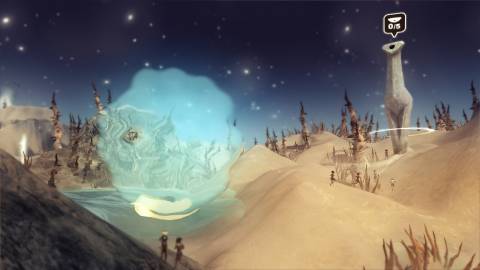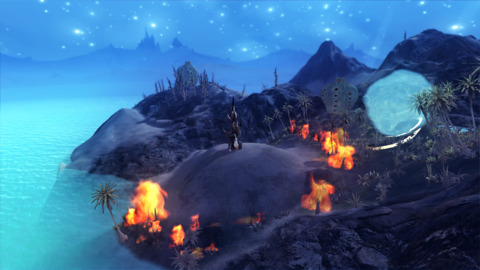
From Dust owes so much to Peter Molyneux and the "god game" tradition of his PC classics Populous and Black & White that one of this new game's challenge levels is directly named after him. The game is also engrossing enough in its own right that it makes you wonder why we don't see more games in this style these days, now that computing power has advanced so far that even a modestly priced downloadable title like this one can offer such immense, tactile control over the very elements of nature, and render them in such a gorgeously evocative fashion.
Like Molyneux's old god games, From Dust casts you as a formless deity with a sky-high perspective on a burgeoning tribal people struggling to gain their footing in a rugged, unforgiving land. But the tools of your godly trade are far more primal and impressive than the ones in those comparatively primitive games. The main game mode consists of over a dozen separate maps, all prebuilt and discrete from one another, in which you have to lead your people to a number of ancient totems where they can build villages and begin to tame the wilderness. Your primary method of clearing the way for your helpless little minions is direct manipulation of earth, water, and lava, namely by sucking those substances up into a floating ball and depositing them elsewhere.
From Dust actively encourages free-form problem-solving because these basic building blocks interact with each other and the land more or less exactly how you'd expect them to. Pour water on top of flowing lava, or dump a stream of lava into a standing body of water, and you've made some new rock. Build a wall of sand around the flow of a river to redirect it away from a village site and toward the ocean--but be careful the water current isn't strong enough to overrun your wall and wash it away. You leave each map looking dramatically different than it did when you started, having made a profound effect on the very lay of the land and the water and vegetation spanning it. Exercising creativity to shape the land in your own way is both the greatest and simplest joy From Dust offers.

Your divine arsenal is so robust that the game has to go out of its way to create situations that can actually challenge you. Individual villages can be wiped off the map by flooding or fire, though you'll never have to completely start a scenario over unless you not only lose all your villages but even all the tiny people who are capable of rebuilding them at your command. The game wastes no time contriving supernatural threats to your settlers, with tsunamis and volcanic eruptions that trigger every couple of minutes in some levels, and other scenarios where the very land itself undulates beneath your village. Still other maps start out with some head-scratching initial conditions, like village totems that are completely submerged underwater, that almost make From Dust feel like an out-and-out puzzle game.
These frequent catastrophes occasionally require stricter timing from you than the game really allows, since it takes a good couple of minutes for settlers and sages to move from one village to the next, and calamity can strike at a moment's notice. That leads to you screaming at the tiny little travelers on the television to hurry the hell up and get where they're going before the lava overtakes them, and sometimes you just can't have the foresight to start them on their journeys at the ideal time until you've already played through most of a scenario once. You'll rarely encounter a disaster so all-encompassing that it destroys everything all at once, though.
As the threats increase, so do your powers. You can plant fire trees to evaporate excess bodies of water, and water trees that spew water in big bursts to squelch nearby flames. But these trees can burn down or flood out your villages, respectively, so care is required in their placement. Bomb trees act as the blunt hammer which, with the application of a little lava or fire, can bust solid rock wide open to make new paths. Then there are the truly magical powers you get on some maps that let you briefly turn all the water around you into a jelly-like solid, or belch infinite earth out of nowhere onto the land.

My only major complaint against From Dust, and it's a big one, is that you just can't lay down your dirt and lava very precisely with the Xbox's analog sticks. You can control how fast you deposit them with the triggers, but the limited camera angles and clumsy stick-based cursor movement introduce a bit more randomness into your terrain-building than I would have liked. There's nothing more frustrating than trying to build a bridge up to the edge of your town with lava, inadvertently setting the foliage on fire because you got a few pixels too close, then having to scramble to grab some water to douse the flames (and flooding your town into oblivion if you're not careful). The PC version, due out next month, may alleviate these issues with its mouse control, but there's no way to be sure just yet. There are also a few baffling quibbles with the interface that make the game hard for no good reason, like the way bomb trees become almost microscopic after they explode. They grow back to normal size once you replant them, but they can be almost impossible to find if they happen to get swept into the water before you can root them again, forcing you to go on a pixel hunt and watching to see where the cursor changes when you hover over them. There's nothing enjoyable about that.
The game's challenge mode occasionally brings the poor precision of the controls into especially blatant relief. There, you've got 30 brief, unique levels that limit your abilities--for instance, you can only absorb water--and task you with completing very specific objectives. There are some great puzzle-like solutions here that make you utilize the game's mechanics in ways you'll never even think about while playing the main campaign. But as the challenges are all timed, you may find yourself fumbling with the controls more than you'd like, trying to lay down very specific terrain with no margin for error. These issues don't pop up constantly, but know that they exist. Otherwise, the challenge mode is a great way to both lengthen the overall game and extend out the mechanics in some interesting ways.
From Dust is a fantastic value, all told, with a bare minimum of eight hours or more that never feels like you're doing exactly the same thing twice. It's been a long time since god games like this were in fashion (if they ever really were), so in a sense we should be happy we've got a new one to play at all. But we should be even happier that this one turned out as well as it did.